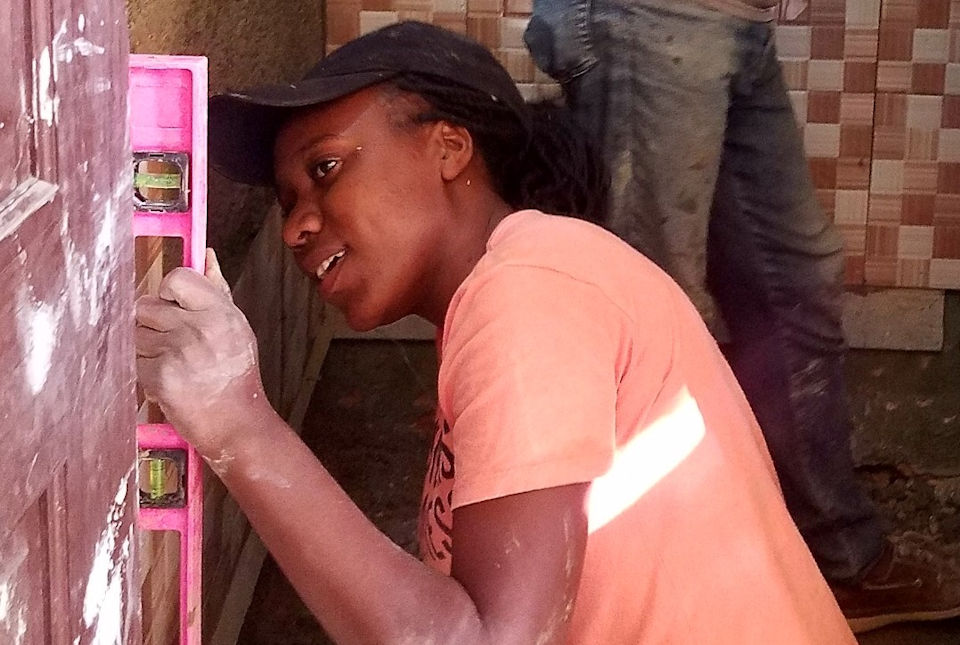Deaconesses have been serving the Methodist Church since 1890. Valerie Mossman-Celestin is one of four deaconesses serving in The Michigan Conference. Here’s how God touched her life and sent her to Haiti.
GLENN M. WAGNER
Michigan Conference Communications
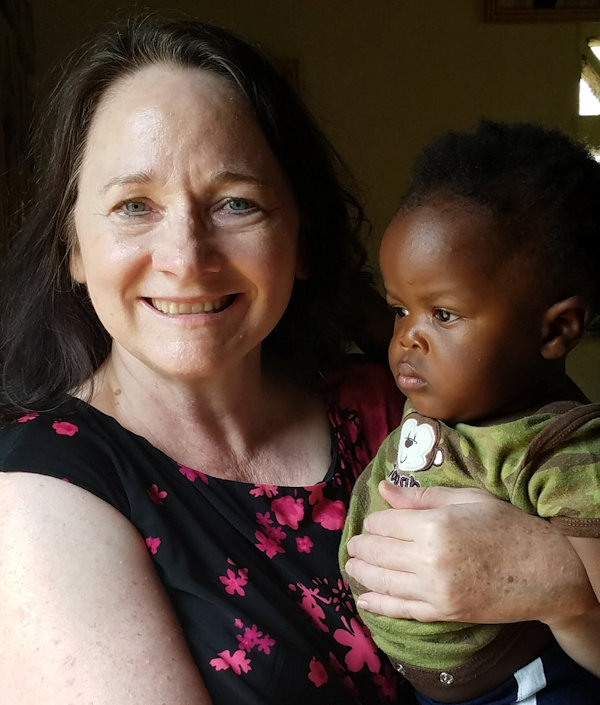
There are times and places where persons of faith can witness the fingerprints of God: in events like the birth of a baby, watching a Lake Michigan sunset, or viewing the vastness of the heavens through a powerful telescope.
The fingerprints of God are also visible in the testimony of a Michigan Conference Deaconess, Valerie Mossman-Celestin, and the vital Haitian ministry she helps to shepherd.
In the compelling story of how Valerie has followed her sense of calling to serve Christ in Haiti and Michigan, there is repeated evidence of how God has touched her life.
Valerie was raised as the oldest of five children in a family that relocated 16 times in her first 16 years. They followed her father’s career, an engineer with a specialization in metallurgy who worked for Honeywell Aerospace in Florida and then for a series of military manufacturers in Florida, Ohio, North Dakota, and Michigan.
Deciding against moving with her family to North Dakota. Valerie graduated from Thornapple Kellogg High School in Middleville, MI, in May of 1980 and married. Her daughter Jessica was born as Valerie went to work for 16 years at Herman Miller Corporation in Zeeland, where she filled a valued role as a manufacturing supervisor on the night shift. During her time in manufacturing, Valerie learned servant leadership from Herman Miller Executive Max DePree and his book, Leadership Jazz.[1] Valerie learned that effective leadership requires getting to know her employees and walking beside them, understanding the struggles of single moms and minorities juggling the obligations of work and demands of raising children.
Valerie noted, “I had a reputation for giving minorities an opportunity. We called our team the ‘little United Nations’ because we were among the most diverse in the plant, including African-American, Caucasian, Hispanic, Laotian, and Vietnamese. In Zeeland, most people ascended at Herman Miller by being a ‘local’ and through seniority with the company; I rewarded initiative.”
Valerie was good at her job and valued by her employer, but she was also reaching a life stage when she was looking for something more. Her marriage had ended, and she hoped for a new beginning. She remembers a pivotal moment when she was prompted to pick up a book about Haiti in a local bookstore. The book whetted her appetite to learn more about this nation situated on the western third of the island of Hispaniola, which also includes the Dominican Republic in the Caribbean Sea. Haiti is located 855 miles southeast of Miami and 397 miles east of Cuba. Haiti is the poorest country in the Western Hemisphere.
Valerie enrolled at Aquinas College in the fall of 1997 while continuing her duties at Herman Miller. She took a course that focused on the study of Haiti and included learning on location in Haiti in May of 1998. The course at the Catholic College was taught by a United Methodist professor, Roger Durham, who was an active member of Trinity United Methodist Church in Grand Rapids.
During that visit to Haiti, the Aquinas students were challenged by the overwhelming poverty they encountered and responded with the comment during the end of the day debriefing, “We have to help.” Valerie challenged class members to think more deeply with her question, “What is help?” Many persons come to Haiti wanting to help, but few ask if their idea of helping is their own or grows from the desires of the Haitians themselves. Valerie learned that of the thousands of non-governmental organizations active in Haiti, none are led by Haitians. Further, most of the aid coming to Haiti comes through these non-governmental agencies and does not address the greatest national needs for infrastructure repairs and improvements like sewage systems and electrical grids.
This course and her initial educational visit to the island convinced Valerie that Haiti was where she wanted to focus the next part of her life journey. In addition, the resident managers of a Haitian guest house believed Valerie was the answer to their prayers when they were looking for a replacement manager.
Shortly after returning to the U.S., Valerie resigned from Herman Miller and returned to Haiti to manage the guest house that provided shelter for short-term Christian mission teams. During this stint, Valerie observed that many short-term mission teams had no interest in eradicating injustice or eliminating poverty. Moreover, many had no plans to address real Haitian needs or grow meaningful long-term relationships with Haitians. Instead, they primarily came to Haiti to “save the lost for Jesus” to be able to report a successful mission to their home congregations in America upon their return.
When the guest house ownership changed to a Canadian company desiring a French-speaking manager, Valerie found new life-shaping work as a high school teacher at the Morning Star Christian Academy in Port-au-Prince, a Haitian school for middle and upper-class children. School leaders similarly believed Valerie was an answer to their prayers. Speaking English and a belief in Jesus were pre-requisites for the job. Here Valerie learned how privileged Haitian children attended schools protected by armed guards to keep them from the constant threat of kidnapping for ransom by gangs and opportunists. The Haitian children, who attended the school where Valerie taught. were shielded from the great poverty around them by their parents.
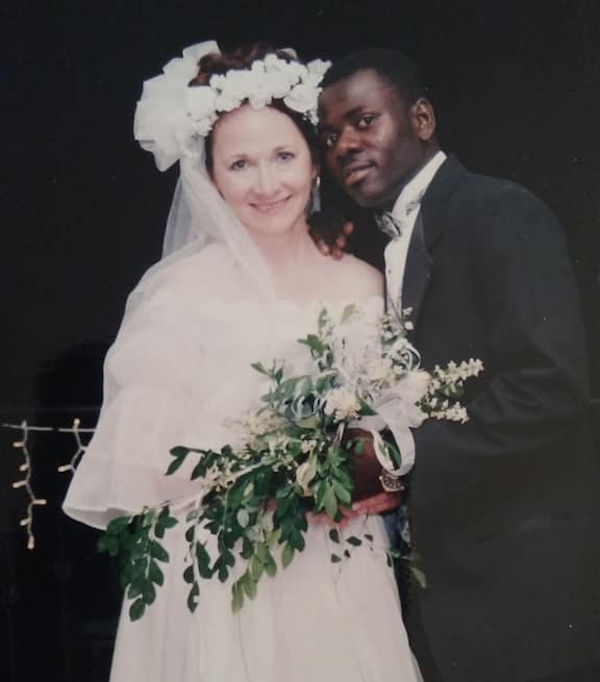
On August 3, 2002, Valerie celebrated her 40th birthday and married Jacson Celestin. At the time, Jacson was a student at Quesqueya University in Haiti and studying to be an agronomist. Valerie recalled that Jacson was the first Haitian she met who had no desire to leave Haiti but believed that Haiti needed the talents of all of her children. Valerie and her new husband looked forward to a long life together in Haiti. However, those plans for permanent residence in Haiti were changed dramatically on December 22, 2002, when the Celestins were assaulted by an armed Haitian gang and robbed at home. The Haitian police were non-responsive to their calls for help. Jacson’s parents feared gangs in the future would similarly target them because their son was now married to a white American woman.
So the Celestins made a difficult decision, for the sake of their family’s safety, and opted instead to move to the U.S., choosing to settle in West Michigan, where Jacson worked hard to learn English and retrain for a career in nursing. Jacson has since earned a biomedical degree from Grand Valley State University and his LPN and BSN degrees from Ohio University to enable his career in providing direct nursing care to patients. The Celestins now reside in Hudsonville with their son, Joshua.
Valerie found new employment as an office manager for the West Michigan Conference of the United Methodist Church in Grand Rapids. Her husband put his nursing skills to work in West Michigan hospitals. Working for the Conference was healing for Valerie, as staff helped her deal with personal trauma and change.
Valerie continued to discern God’s call upon her life. She knew she was not called to be a pastor and still felt that Haiti was an important part of her calling. She learned about the Deaconess program and decided to attend an orientation to the United Methodist Deaconess ministry offered a week later in New York. When a winter snowstorm threatened to ground her scheduled flight to New York, Valerie loaned her cell phone at the airport to another traveler who was frantically calling other airlines to book an alternate flight to New York. That woman also booked a new ticket for Valerie, paid her fare for her, and helped Valerie find a seat on the last flight out that night to New York so they could both make their engagements. It surprised both women to learn that Valerie was hoping to become a Deaconess and her benefactor, grateful for the emergency use of a cell phone, was an avowed atheist!
The orientation for the Deaconess program, with its explanation of persons called to serve Christ at the point of human need beyond the church walls, fit Valerie’s sense of who God is calling her to be. Valerie enrolled in the Deaconess training, which involved independent study coupled with scattered weeks of in-person learning that she stretched over four years. She was officially consecrated as a Deaconess during the 2012 General Conference meeting of the United Methodist Church held in Tampa, FL. Valerie was also an elected delegate from the West Michigan Conference for that General Conference.
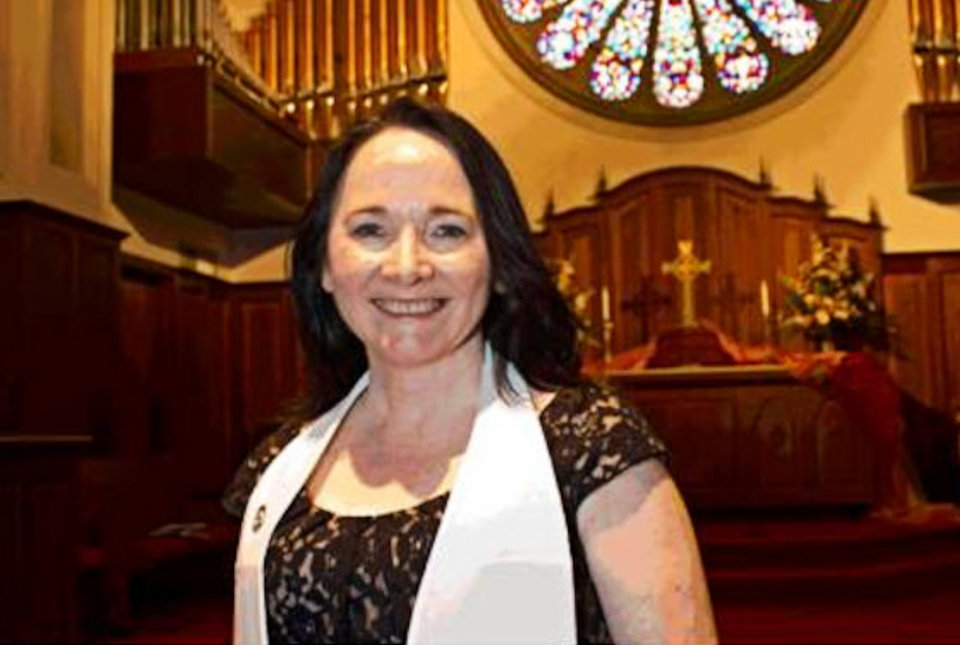
While she was training for her role as a Deaconess, working for the West Michigan conference, and balancing her roles as a wife and a mother, Valerie was still actively serving Christ and developing her work in Haiti. With the help of Paul Prevost, Valerie was introduced to the rural Haitian village of Mizak, a mountainous rural community about 60 miles south of the capital Port-au-Prince.[2]
Mizak has a population estimated to be between 15,000 and 35,000 people depending on who counts. Valerie believes 40 percent of Mizak’s residents are trying to survive in extreme poverty with an income of about $1.00 a day. Fifty-five percent of the population lives at the next tier of poverty with income from $2.00 – $3.00 per day. The population of Mizak is rather young, with 63% under the age of 18 years. Mizak is about eight miles from Jacmel, the nearest city, which has a population of 138,000. Mizak is a community without running water or electricity. The main road up the mountain was paved several years ago, a great blessing, but the rest are dirt and sometimes accessible only by motorcycles, the most common means of transportation.
Rather than make assumptions about what would be best for the residents of Mizak, Paul and Valerie asked them directly, “What do you want and need?” Valerie remembers that the women of Mizak wanted more than “rice and beans.” They wanted the respect that comes from meaningful work. The artisans further expressed strong desires for their children, “Education, education, education.” Valerie observed, “These women are nearly all illiterate or have only a minimal education, so their hopes are for their children. They also said they wanted a maternity hospital for their community because too many women were dying in childbirth.” Valerie also noted that “The residents of Mizak want to be able to feed themselves. They want to grow as people.”
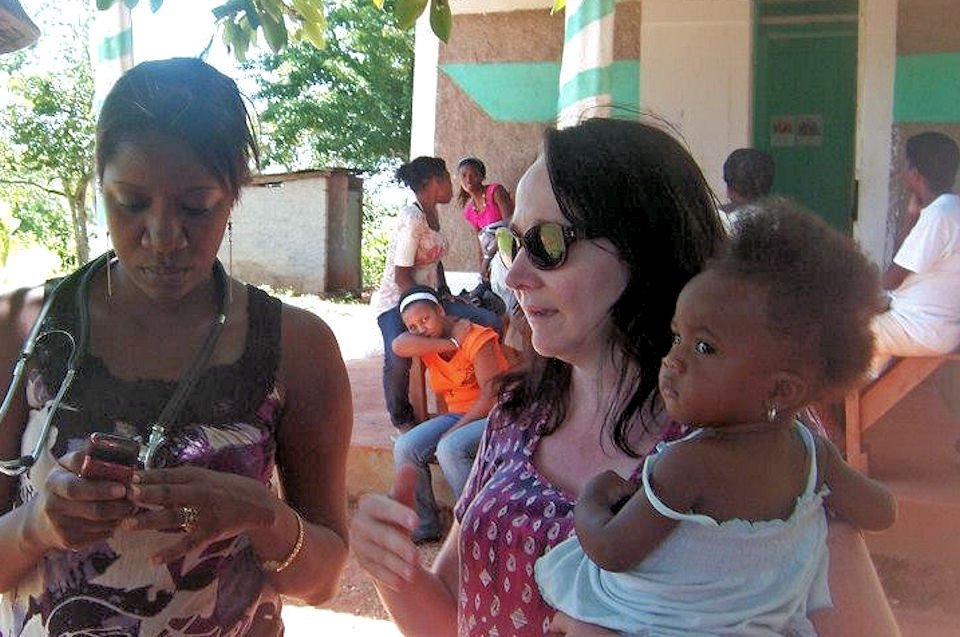
So the ministry of HAPI [3] was launched with Haitian input as ‘Haitian Artisans for Peace International’ in 2007 with a mission to empower rural women economically through fair trade crafts. However, changing circumstances in Haiti have inspired HAPI to transition from ‘Haitian Artisans’ to ‘Haitian Assets’ to reflect the mission’s evolvement into health and vocational sectors.
HAPI currently provides important education, training, and medical support for expectant mothers. Valerie shared, “Start Right (maternal care) is our clinic’s flagship program, but we are a community health center with urgent care, malnourishment programs, a mobile clinic for disabled persons. Maternity is 24/7; our other services are a day clinic. The Mizak Community now wants medical care that is 24/7 and that also includes more advanced urgent care.” She explained that HAPI had hired Mizak’s first doctor, a generalist MD who works four days a week and is funded in part by the 2020 Michigan Annual Conference offering. However, additional medical care is still an important goal. For example, many after-hours farming and motorcycle accidents and burns from cooking fires need treatment, and Mizak still has no local surgical care.
HAPI is also offering vocational education and training, called HAPITech. In addition, with the help of the United Methodist Women, HAPI helps Haitian families to raise goats. A generous grant of $350,000 from the United Methodist Committee on Relief after the earthquake in 2010 helped HAPI build the Merlet Center that houses their programs.
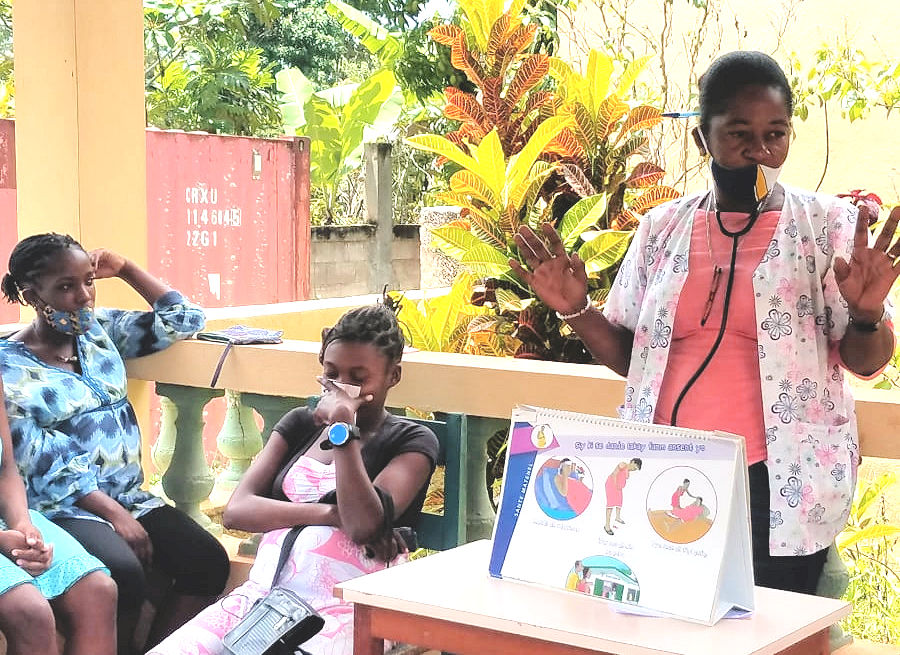
A recent newsletter sent from Valerie to HAPI’s supporters highlighted the continuing need for this vital work in Haiti. Despite the challenges posed by the recent challenging events in the country, continuing demand for HAPI services is high, as are the urgent needs HAPI is meeting. The newsletter states: “The assassination of President Jovenal Moise is just the latest in a saga of gang warfare and violence that has created turmoil in Haiti the past two+ years. As a result of gangs paralyzing the flow of people and goods and shuttering businesses, resources in rural Haiti are extremely low; inflation, violence against women, internal migrants, and hunger are exceptionally high. These realities have surged demand on HAPI services.” Unfortunately, at a time when their services are needed most, a July fire in their safe storage destroyed medicines, computers, and cash. A bishop’s appeal to date has only raised $400 of the $20,000 goal, with another $10,000 pledges outstanding.
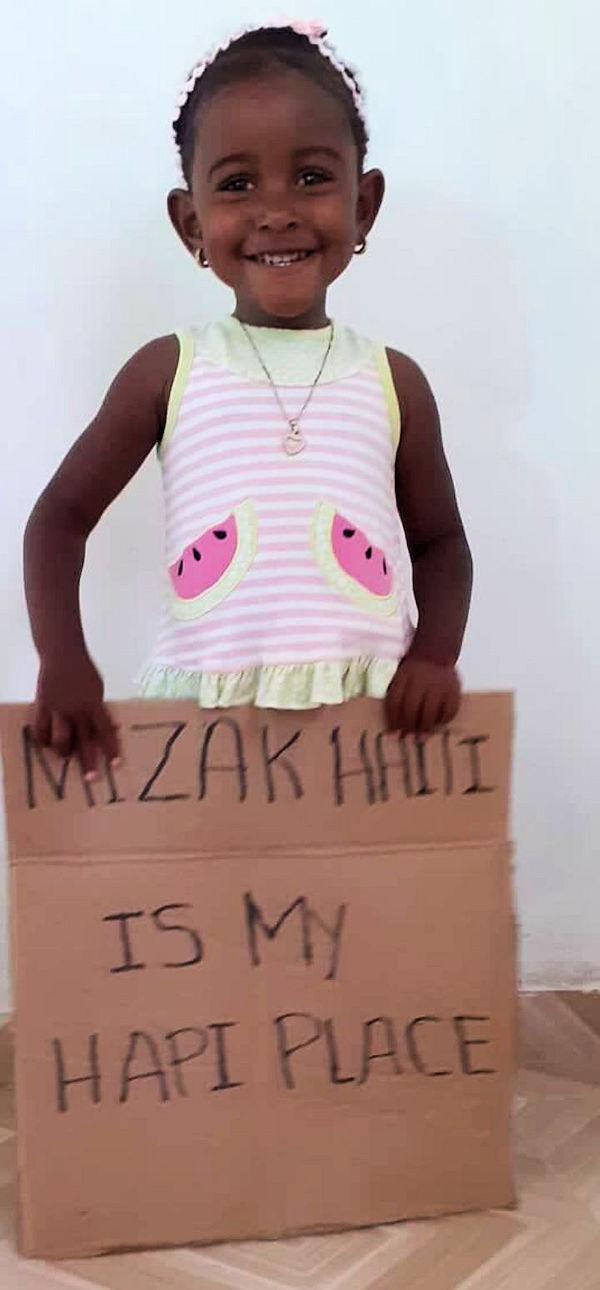
Learn more and give
- Live webinars on Sunday evenings, August 22 and October 3 at 6:00 PM EDT. All are invited to learn more about the current situation in Haiti and the impact that it has had on HAPI. Click here for the August 22 webinar event and select ‘Going.’
- GROW Haiti (Giving Real Opportunities to Women), September 21 – October 11, 2021. This interactive, virtual race around Haiti allows congregations to engage the humanitarian and economic crisis in Haiti–from your own location, in your own time. Funds raised will benefit health, training, and fair wage jobs for women and girls through HAPIHealth and HAPITech located in Mizak. Participants will receive a phone app that features individual peer fundraising pages, goal tracking, and an online scrapbook to share photos in real-time. Any physical activity counts! HAPI’s website will have a map of Haiti to track collective progress around the island. Sign up as an individual or create a team. All participants will receive a T-shirt with GROW logo. Prizes will be announced. GROW Haiti registration opens on August 17. Plan now to register your Adult Ed, small group, or engage the entire congregation. This link will be live on August 17 and will stay active through October 11) or visit www.HaitianAssets.org on August 17.
“But those who hope in the Lord will renew their strength. They will soar on wings like eagles; they will run and not grow weary; they will walk and not be faint.” ~Isaiah 40:31
Being touched by the fingerprints of God can be transformational.
Jesus reminds us in his parable of the last judgment that God continues to work in the world and especially desires our involvement in helping to meet real human needs. Jesus tells us where we can see God’s fingerprints most clearly, “As you have done it to one of the least of these, my brothers and sisters, you have done it unto me.”
If you want to experience the fingerprints of God in your own life, lend your hand to Valerie, HAPI, and the vital work in Mizak, Haiti. God will be in touch.
Footnotes:
- On page 17 of Max DePree’s book, Leadership Jazz, Valerie is referenced in the story, “A Key Called Promise.”
- Mizak is the popular Creole spelling for the town, also known as Musac in the French, which is more likely to be found in a Google search online for the town.
- HAPI is part of EngageMI, whose mission is to engage Michigan congregations to “learn, act and give” with ministry partners. HAPI is an Advance Special of the General Board of Global Ministries #3020490.
Last Updated on October 31, 2023

